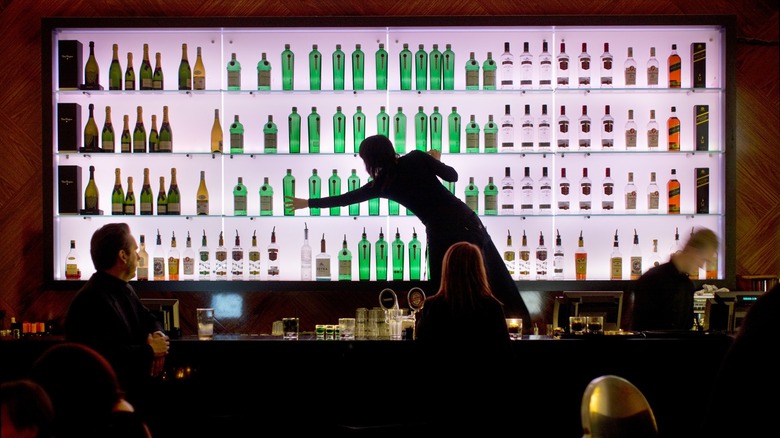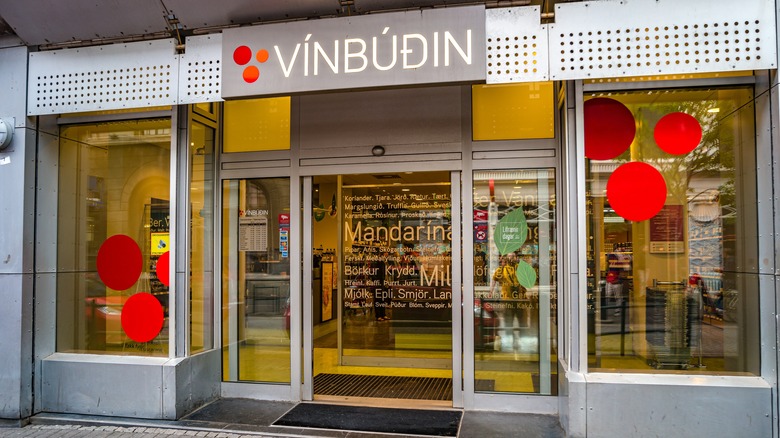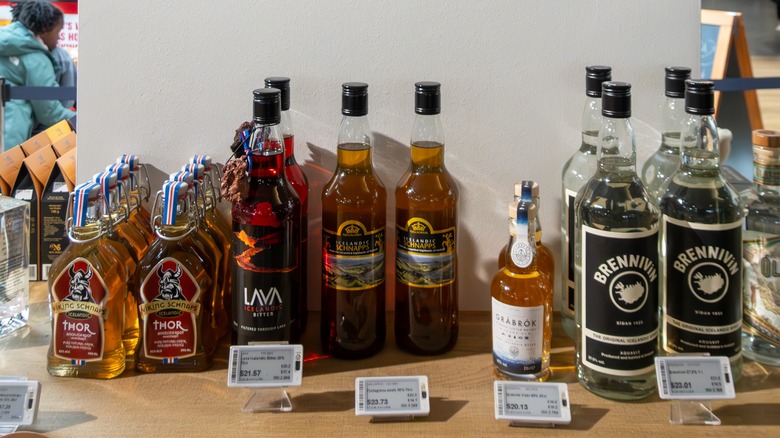The Popular European Country Where Tourists Will Have A Harder Time Finding Alcohol
Iceland is famously called the land of fire and ice, but unfortunately, it is not the land of cheap, accessible alcohol. An increasingly popular destination — with nearly 2 million annual visitors — it promises stunning landscapes, unique cultural experiences, and the sublime northern lights. While visitors revel in the country's beauty and adventures, they might find themselves challenged when it comes to buying alcohol. Unlike other European destinations, Iceland's approach to alcohol sales is distinctively stringent due to its complex history and cultural values, which prioritize well-being over convenience.
Iceland's relationship with alcohol has been historically tumultuous. In the early 20th century, the country imposed a complete prohibition on alcohol, a ban that lasted from 1915 to 1935. This was driven by a mix of social and political pressures, with a strong influence from temperance movements that saw alcohol as a problem affecting society. Even after the prohibition was lifted, beer with an alcohol content above 2.25% was banned until 1989. The remnants of these restrictive policies are still somewhat present today.
Alcohol sales are tightly regulated by the government, and the retail of alcohol is starkly different from what tourists might find in other parts of Europe. Specifically, alcoholic beverages are not sold in corner shops or supermarkets, with the Icelandic government having a nearly complete alcohol monopoly. However, most notable are the taxes, which gravely hike the price of alcohol in Iceland. When buying hard liquor, 92% of its price goes to taxes, 73% for wine, and 61% for beer.
State-controlled shops and alcohol prices in Iceland
In Iceland, alcohol can only be purchased from stores called Vínbúðin, pronounced Vinbuthin. Besides bars, restaurants, and nightclubs, these outlets — recognizable by a distinctive red wine grapes logo — are the sole retailers of alcohol, and their operations are overseen by the state monopoly, ÁTVR. Supermarkets only sell non-alcoholic or 2.25% ABV beverages. ÁTVR ensures that the government has total control over alcohol distribution and sale, with a focus on minimizing its negative impacts — and also cushioning government budgets with heavy taxation of alcohol.
Vínbúðin stores are not ubiquitous; they are located in specific areas rather than scattered throughout cities and towns, with only 51 of them country-wide. Their operating hours are restricted, typically only open on weekdays from 11 a.m. to 6 p.m. and closed on Sundays. Countryside stores have even more limited hours, 4 p.m. to 6 p.m., a tight two-hour window. For tourists used to 24/7 access to alcohol in convenience stores or supermarkets, this can be quite a shock. Moreover, the legal drinking age in Iceland is 20, and you must carry your ID because they do card indiscriminately.
What are the prices like? We're sorry you asked. At Vínbúðin, the cheapest bottle of wine starts around $16, the cheapest beer costs $2, a Heineken $3.5, and a full bottle of hard liquor like Jack Daniels bourbon or Absolut Vodka costing between $73 to $87.
Tips for tourists
If you're going to Iceland — and hoping to have a drink or two — we have a hot tip that will be a game-changer for finding alcohol on your adventure, and it begins before you "officially" set foot in the country. At Keflavík airport, stock up at the arrival duty-free store. Why? Because alcohol prices are one-third lower or even half the cost of what you'll find at Vínbúðin!
However, if you do have to go to a Vínbúðin, research locations and store hours on the official website to plan your visit and avoid being caught off guard by early closing times. While shopping there, opt for Icelandic beers like Egils, Viking, and Thule or traditional beverages like Brennivín and locally distilled vodkas. Microbreweries, like Kaldi in Árskógssandur or Dokkan Brugghús in Ísafjörður, are quite the rage, as they produce delicious beers that are much more affordable than imports.
Drinking at restaurants and bars will run a hefty tab: $9 to $11 per beer and even more for cocktails. As such, pre-drinking is the Icelandic norm, and people don't hit the town on a rúntur (local pub crawl) until 11 p.m. If you're on the prowl for cheap alcohol, Iceland might not be the right country for you — but with some of these tips, finding and enjoying alcohol in the land of fire, ice, and expensive-ish booze might be a little bit easier.


